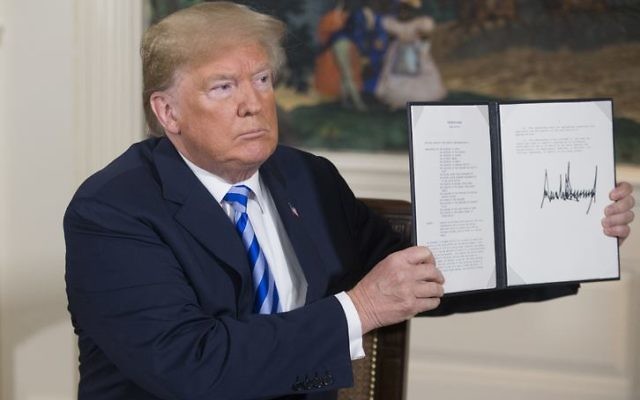‘Defective’ deal ditched
AS global leaders reacted to Donald Trump's announcement in the early hours of Wednesday morning, Australian time, that he was pulling the United States out of the "decaying and rotten" Joint Comprehensive Plan of Action (JCPOA) with Iran, a deal that was "defective at its core", Israel, which welcomed the news, prepared for repercussions across its northern border.

AS global leaders reacted to Donald Trump’s announcement in the early hours of Wednesday morning, Australian time, that he was pulling the United States out of the “decaying and rotten” Joint Comprehensive Plan of Action (JCPOA) with Iran, a deal that was “defective at its core”, Israel, which welcomed the news, prepared for repercussions across its northern border.
An IDF spokeswoman told The AJN that having identified “irregular activity of Iranian forces in Syria”, it was setting up Iron Dome missile defence systems in the Golan Heights and was telling local authorities there to unlock bomb shelters.
Despite the threat, Israeli leaders threw their full support behind Trump’s decision to reimpose “powerful sanctions” on Tehran, with President Reuven Rivlin saying it “constitutes an important and significant step in ensuring the security of the State of Israel, the security of the region and the security of the entire free world”.
The sentiment was echoed by Prime Minister Benjamin Netanyahu. Noting the deal “didn’t push war further away, it actually brought it closer”, he said Trump had made “a historic move” and thanked him for his “courageous leadership”.
Under the 2015 deal reached between Iran and six world powers, Tehran agreed to limit its nuclear activities in return for sanctions relief.
However, under the deal’s “sunset clause”, all restrictions would be lifted after 10 years, allowing the Islamic Republic to pursue nuclear weapons without international sanction, a point noted by Israeli Ambassador to Australia Mark Sofer, who said the deal was “deeply flawed from the start”.
“Instead of preventing Iran’s path to a nuclear bomb, it actually paved the way, since in a few years Iran will be able to enrich uranium on an industrial level,” he told The AJN. “In the interim, removal of sanctions facilitated increased Iranian military involvement and irredentism in Syria, Lebanon and Gaza.”
Alongside Israel, Saudi Arabia, the United Arab Emirates and Bahrain also issued statements supporting the decision.
But these ringing endorsements were at odds with the response from much of the Western world, with European Union (EU) foreign policy chief Federica Mogherini saying the EU “was determined to preserve” the deal.
Former US president Barack Obama, who championed the agreement, called the US withdrawal “a serious mistake”.
And closer to home, Australian Prime Minister Malcolm Turnbull expressed a similar position when he spoke to Sky News’ Kieran Gilbert on Wednesday morning.
“We do regret the US pulling out of the Iran deal. We believe it was the best option to maintain the ability to verify Iran’s compliance with its commitments on nuclear development,” he said.
He continued, “We’d urge all parties to show restraint. The Europeans, I believe, will continue with the deal and we hope that Iran does too.”
Foreign Minister Julie Bishop said that “while Australia shares, with members of the international community, concerns about elements of Iran’s behaviour in the Middle East” the government was nevertheless disappointed by Trump’s announcement.
“The Australian government has consistently said that the JCPOA should remain in force until such time that an alternative agreement can be negotiated,” she said.
“While the US decision creates uncertainty for the future of the JCPOA, we strongly encourage Iran to continue to abide by its provisions.”
She noted that the deal requires “that under no circumstances will Iran ever seek, develop or acquire any nuclear weapons”.
GARETH NARUNSKY

comments